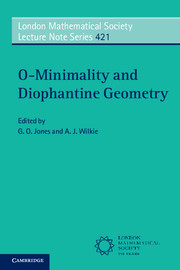Book contents
- Frontmatter
- Contents
- Preface
- 1 The Manin-Mumford Conjecture, an elliptic Curve, its Torsion Points & their Galois Orbits
- 2 Rational points on definable sets
- 3 Functional transcendence via o-minimality
- 4 Introduction to abelian varieties and the Ax–Lindemann–Weierstrass theorem
- 5 The André-Oort conjecture via o-minimality
- 6 Lectures on elimination theory for semialgebraic and subanalytic sets
- 7 Relative Manin-Mumford for abelian varieties
- 8 Improving the bound in the Pila-Wilkie theorem for curves
- 9 Ax-Schanuel and o-minimality
1 - The Manin-Mumford Conjecture, an elliptic Curve, its Torsion Points & their Galois Orbits
Published online by Cambridge University Press: 05 August 2015
- Frontmatter
- Contents
- Preface
- 1 The Manin-Mumford Conjecture, an elliptic Curve, its Torsion Points & their Galois Orbits
- 2 Rational points on definable sets
- 3 Functional transcendence via o-minimality
- 4 Introduction to abelian varieties and the Ax–Lindemann–Weierstrass theorem
- 5 The André-Oort conjecture via o-minimality
- 6 Lectures on elimination theory for semialgebraic and subanalytic sets
- 7 Relative Manin-Mumford for abelian varieties
- 8 Improving the bound in the Pila-Wilkie theorem for curves
- 9 Ax-Schanuel and o-minimality
Summary
Abstract
This is an extended write-up of my five hour lecture course in July 2013 on applications of o-minimality to problems in Diophantine Geometry. The course covered arithmetic properties of torsion points on elliptic curves and how they combine with the Pila-Wilkie Point Counting Theorem and the Ax-Lindemann-Weierstrass Theorem to prove a special case of the Manin-Mumford Conjecture.
Overview
These notes are a write-up of my lecture course titled Diophantine Applications which was part of the LMS-EPSRC Short Instructional Course – O-Minimality and Diophantine Geometry in Manchester, July 2013. The purpose of the short course was to present recent developments involving the interaction of methods from Model Theory with problems in Number Theory, most notably the André- Oort and Manin-Mumford Conjectures, to an audience of students in Model Theory and Number Theory.
At the heart of this connection is the powerful Pila-Wilkie Counting Theorem [26]. It gives upper bounds for the number of rational points on sets which are definable in an o-minimal structure.
The Manin-Mumford Conjecture concerns the distribution of points of finite order on an abelian variety with respect to the Zariski topology. We give a rather general version of this conjecture, later on we often work in the situation where the base field is Q, the algebraic closure of Q inside the field of complex numbers C. But soon we concentrate on the power of an elliptic curve.
Theorem 1.1 (Raynaud [32]) Let A be an abelian variety defined overC. Let X be an irreducible closed subvariety of A. We write
Ators = {P ∊ A(C); P has finite order}
for the group of all torsion points of A. Then χ(C) ∩ Ators is Zariski dense in χ if and only if χ is an irreducible component of an algebraic subgroup of A.
Any algebraic subgroup of A is a finite union of translates of an irreducible algebraic subgroup by points of finite order. The theory of abelian varieties guarantees that the torsion points lie Zariski dense on any algebraic subgroup. Showing that torsion points do not lie Zariski dense on a subvariety that is not a component of an algebraic subgroup is the difficult part of the Manin-Mumford Conjecture.
Information
- Type
- Chapter
- Information
- O-Minimality and Diophantine Geometry , pp. 1 - 40Publisher: Cambridge University PressPrint publication year: 2015
